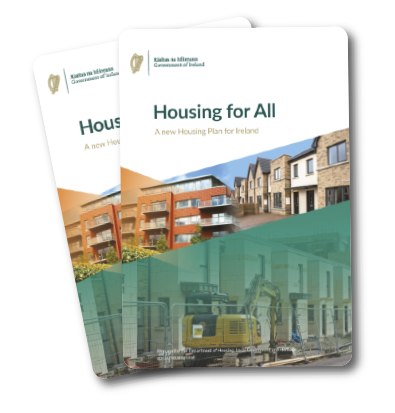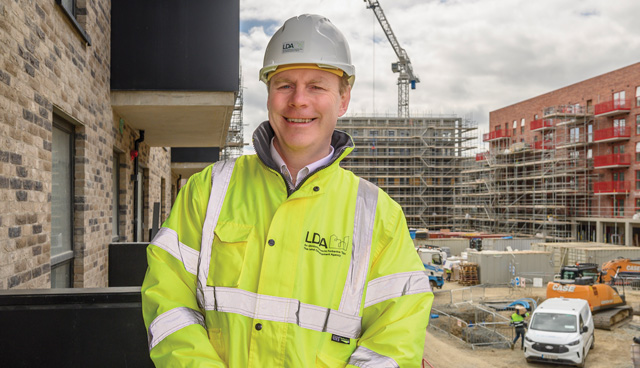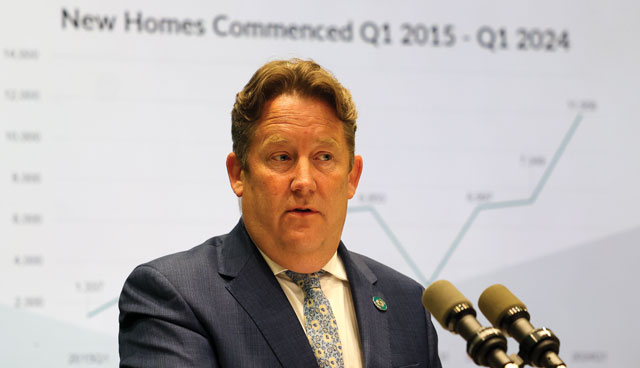
Uisce Éireann: Enabling Ireland to thrive
4th July 2024
Innovative housing for wellbeing: Respond’s Brain Health Village
4th July 2024Housing for All progress ahead of major change

Ahead of the publication of the new housing delivery targets expected as part of the National Planning Framework revision, Chloé Murray assesses Housing for All progress.
The latest quarterly progress report outlines that to date, building started on over 37,400 new homes in the year to the end of March 2024. Additionally, commencements in the first quarter of 2024 are up 63 per cent compared to the first three months of 2023. Despite this, the Housing Commission’s report estimates that Ireland’s housing deficit is between 212,500 and 256,000 homes as of April 2022. Updated figures to tackle the deficit are to be published by September 2024 in the first revision of the National Planning Framework.
Regarding the 2024 surge, the Q1 report highlights the increase is mainly due to the development levy waiver and the Uisce Éireann rebate, which have subsequently been extended to the end of 2024 and September 2024, respectively. Furthermore, the latest progress report highlights the Government is confident this year’s delivery target of 33,450 new build houses will be met.
Future planning approvals also saw a boost, with 41,000 homes approved in 2023 – a 21 per cent increase from the previous year, thus setting a solid foundation for continued growth.
Social and affordable housing
Efforts to improve social and affordable housing have led to the establishment of a working group consisting of the LGMA, the ICSH and The Housing Agency focused on reviewing data related to the efficiency of housing allocation processes. To date, the working group has determined that the lack of consistent data was a barrier to assessing existing practices. A pilot project has been initiated to improve data sharing within local authorities, and new guidance through a ministerial circular on the allocation is currently being developed.
Innovation is a key focus, with an Innovation and Efficiencies in Affordable Housing Design report published to demonstrate effective construction delivery methods. This report also includes case studies from Ireland and other EU member states.
The report highlights that 300 new homes on state land are due to be completed in Shanganagh, Shankill, Dublin via a partnership between the Land Development Agency (LDA) and Dún Laoghaire-Rathdown County Council in 2024. Alongside schemes underway at St Kevin’s in Cork, the former Devoy Barracks in Naas, Skerries, Cromcastle, and Limerick. Furthermore, the LDA and Dublin City Council have published draft plans for almost 400 new social and affordable homes in Bluebell, Dublin.
The report acknowledges that State support continues through schemes like Croí Cónaithe, which aims to deliver 600 apartments, and Project Tosaigh, which has facilitated the delivery of over 2,500 social, affordable, and cost rental homes to date.
Private sector purchasing
Regarding the private sector, the Q1 progress report indicates that there has been a robust response, with 30,450 first time buyer (FTB) mortgages approved in 2023 and a 10 per cent increase in Q1 2024. Government attributes this growth to initiatives such as Help to Buy and the First Homes Scheme, which has over 4,000 approvals since July 2022. Additional funding of €40 million in state funding has been allocated to sustain these efforts.
The Vacant Property Refurbishment Grant was introduced in July 2023 and is credited with 4,300 approvals. The Bringing Back Homes Manual also supported 2,500 vacant social homes under the Voids Programme in preparing vacant homes for re-letting. Furthermore, the manual has been updated and regulatory changes were published in April 2024.
Private rental
The Government is finalising a review of the private rental sector aimed at determining how the housing system can be enhanced to provide “an efficient, affordable, viable, safe, and secure framework for both landlords and tenants”.
The Legal Services Regulatory Authority (LSRA) report on the creation of a new profession of conveyancer was published, and the Department of Justice is considering its recommendations. An expert group has been established tasked with identifying short-term measures to reduce delays and costs for home purchasers in conveyancing and probate processes.
The Government also aims to publish the Short-Term Tourist Letting Bill to increase rental property availability, potentially adding 12,000 properties back into the long-term rental market. The Government has said they intend for the bill to be passed before the Oireachtas summer recess.
Finance
In March 2024, €2.25 billion was allocated to the National Development Plan to deliver more than 1,000 purpose-built accommodation beds at UCD, DCU, and Maynooth University.
Government’s analysis estimates that the development finance required to meet the average Housing for All target of 33,000 homes is now approximately €13.6 billion per annum. Private finance sources provided approximately 82 per cent of the development finance required to deliver just over 29,850 houses in 2022, with the State providing the remaining 18 per cent.
The most recent progress report states: “It is therefore critical that Ireland continues to attract private capital alongside its public investment and the policy certainty provided by Housing for All is crucial to attracting this investment.”
Planning and construction
The new Planning and Development Bill, the cornerstone of the Government’s housing policy, will face Seanad scrutiny after the summer recess, despite the Housing Minister Darragh O’Brien TD promising it will be enacted before then. The Bill aims to “bring greater clarity, consistency, and certainty to how planning decisions are made and enable us to build houses and critical infrastructure at pace”, however, following 123 hours at committee stage, multiple amendments proposed in the Dáil saw the Government utilise the guillotine mechanism to cap the time the Bill could be discussed.
A €750,000 investment in the construction sector supports the Action Plan to Promote Careers in Construction, focusing on attracting international workers and promoting early education in construction careers.
Proposals for creating an independent building standards regulator are also being developed, and a new modern methods of construction (MMC) online platform is being developed to highlight career and upskilling opportunities.
The Government also aims to increase the use of MMC in social housing delivery. Progress on the implementation of an accelerated delivery programme for approximately 1,500 new social homes on 33 sites across 13 local authorities using MMC is being closely monitored.
An Implementation Steering Group has been formed to oversee the enhanced Defective Concrete Blocks Grant scheme and address emerging issues, as well as make necessary recommendations.
Pilot projects have been initiated in counties Carlow and Wexford to develop social housing using offsite three-dimensional construction methods.
National Planning Framework
While Housing for All has gained significant momentum, the latest progress report states that ongoing challenges such as “growth in population, changes in demographics, interest rate increases, supply chain issues and many other factors” necessitate continual reviews and adjustments.
The Government will publish the delayed first revision of the National Planning Framework. Speaking with the Housing Ireland Magazine, Minister for Housing, Local Government and Heritage, Darragh O’Brien TD stated that this will be implemented in September 2024, despite completion originally due in April 2024. The Framework will be accompanied by new Housing for All targets for 2025 onwards, informed by independent, peer-reviewed research by the ESRI.
Homelessness and social inclusion
Regarding homelessness and social inclusion, a national Youth Homelessness Strategy Progress Report was prepared, detailing actions across DHLGH to combat and eradicate homelessness. This includes initiatives such as Tenant in Situ acquisition schemes, targeted leasing, schemes to tackle vacancy, and actions from the National Homeless Action Committee. The overview aligns with commitments from the Lisbon Declaration on the European Platform on Combatting Homelessness which aims to eradicate homelessness by 2030.
Strategic review of AHB sector
A strategic review of the approved housing bodies (AHB) sector is underway, with findings expected to help improve operational efficiency and effectiveness.
Lastly, regarding land development, following the Land Development Agency’s Report on Relevant Public Land, stakeholder engagement was completed in March 2023, and recommendations were made for developing housing on 83 areas of public land in urban centres, potentially delivering up to 66,910 homes. These recommendations were approved by the Government in February 2024.
Substantial momentum needed
Despite Housing for All’s building momentum, it is now unquestioned that the target of 300,000 homes by 2030 is inadequate to meet the housing demands of Ireland’s growing population.
Acknowledging the deficit, the department has engaged the Economic and Social Research Institute (ESRI) to update its previously published independent and peer-reviewed research on structural housing demand and the calculation of housing supply targets at local authority level.
The need for ongoing adjustments to accommodate demographic shifts, economic fluctuations, and supply chain constraints will evaluate the resilience of these initiatives. Likewise, a focus on attracting private capital, alongside robust public investment, will be crucial in sustaining momentum.








